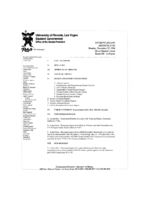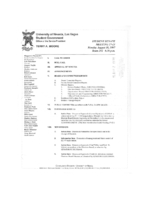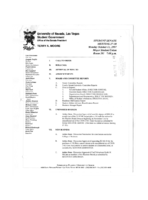Search the Special Collections and Archives Portal
Search Results
Marge Jacques Papers
Identifier
Abstract
The Marge Jacques Papers (1960-1990) comprise the personal papers of Marge Jacques, a prominent member of the Las Vegas, Nevada gay and lesbian community, and owner of the gay bar, Le Cafe. The papers contain correspondence, licensing records, financial statements, and artifacts from clubs that Jacques owned or managed. Also included are photographs, videotapes, audiotapes, newspaper clippings, and Gipsy Nightclub promotional material.
Archival Collection
Joseph "Wingy" Manone Papers
Identifier
Abstract
The Joseph "Wingy" Manone Papers (1934-1996) include a partial draft of his autobiography, newspaper clippings, correspondence, magazine articles, and press releases related to his musical career. Manone also wrote music, some of which is included in the collection.
Archival Collection
Central Credit, Inc. Records
Identifier
Abstract
The Central Credit, Inc. Records (1956-1987) contain meeting minutes, employee records, business ledgers, newspaper clippings, membership applications, photographs, and reports. Also included are incorporation papers, a Code of Ethics, Credit Law, Tod Early's personal calendars/diaries, and audiovisual materials. Central Credit, Inc. had branches in Reno, Las Vegas, and Lake Tahoe, Nevada, and also in London.
Archival Collection
Danny Cassella Collection of Sheet Music
Identifier
Abstract
The Danny Cassella Collection of Sheet Music (1940s-1960s) consists of stock arrangements for songs and scores from the 1940s through the 1960s. The arrangements were collected by musician Danny Cassella. Additionally the collection contains several Tune-Dex cards.
Archival Collection
North Las Vegas Library District Records
Identifier
Abstract
The North Las Vegas Library District records (1959-2006) contain awards and commendations, events, scrapbooks, a diary and photographs relating to the building of the library, budgets, grants, and documents about the expansion project. Also included are four over-sized posters and three large floor plans, two for the garage and one library interior plan.
Archival Collection

Alex de Castroverde oral history interview: transcript
Date
Archival Collection
Description
Oral history interview with Alex de Castroverde conducted by Monserrath Hernandez on April 17, 2019 for the Latinx Voices of Southern Nevada Oral History Project. In this interview, De Castroverde discusses his family's background and his parent's emigration story from Cuba to the United States. He talks about growing up in Reno, Nevada, his father becoming a lawyer, and attending the University of Nevada, Reno. De Castroverde remembers the establishment of De Castroverde Law Group, the significance his father had on the Hispanic community in Las Vegas, Nevada, and taking over operations of the law firm with his brother. Lastly, De Castroverde talks about his involvement with Cristo Rey St. Viator College Preparatory High School, the Guinn Center, and the Las Vegas Business Academy.
Text

Transcript of interview with Elmer Hilsinger by Irene Rostine, October 2, 1991
Date
Archival Collection
Description
When Mr. Elmer Hilsinger arrived from the Los Angeles area in 1942, to work as a Refractory Inspector in the Engineering Department at Basic Magnesium Incorporated (BMI), little did he know the town site would grow to be known as Henderson, Nevadain a few short decades. Mr. Hilsinger’s oral history provides a glimpse of the work being done by women at BMI, including women working as chemists, truck drivers, and secretaries. His words attest to the strong work ethic demonstrated by women at the plant during the “war work” period. Through Mr. Hilsinger’s story, we are also provided with an account of what daily life was like for a married couple, including Mr. Hilsinger’s life with his wife who worked as a waitress at Anderson Camp. In addition, Mr. Hilsinger’s oral history touches on the evolution of safety rules within the plant, the transition from the American Federation of Labor Union to the Congress of Industrial Organizations Union, and the role prostitution played during the tim
Text

Meeting minutes for Consolidated Student Senate University of Nevada, Las Vegas, November 25, 1996
Date
Archival Collection
Description
Text

Meeting minutes for Consolidated Student Senate University of Nevada, Las Vegas, August 18, 1997
Date
Archival Collection
Description
Text

Meeting minutes for Consolidated Student Senate University of Nevada, Las Vegas, October 13, 1997
Date
Archival Collection
Description
Text
